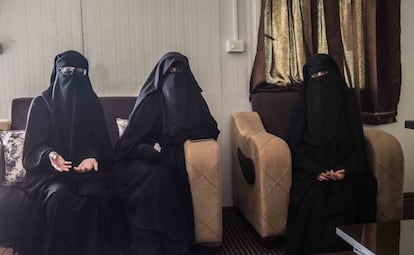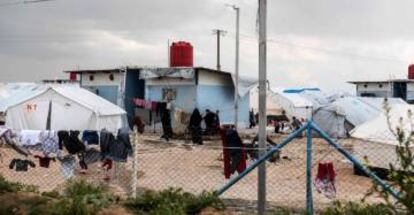Spanish prosecutors consider legal action against ISIS women in Syria
Two of the Spaniards located at a camp for Islamic State followers are already under investigation by Spain’s High Court, and all three could face terrorism charges back home

The prosecutor’s office at Spain’s High Court, the Audiencia Nacional, has asked the Interior Ministry for reports to determine whether to take action against three Spanish women who traveled to Syria in 2014 to join the so-called Islamic State (ISIS).
Following the fall of Baghouz, the last ISIS stronghold, these women were taken to Al Hol, a holding camp on the border with Iraq, where EL PAÍS located and interviewed them. All three said they want to go back to Spain with their children.
One cannot remain static, one must take action
Letter by Yolanda Martínez
But they could be charged with being members of a terrorist group. Counter-terrorist sources said that two out of the three women have already named in earlier investigations at the High Court.
Yolanda Martínez, Luna Fernández and Lubna Miludi were recently interviewed inside Al Hol, a camp along the border with Iraq that holds an estimated 73,000 people who were once part of the social structure created by ISIS to build its caliphate. Of these, around 92% are the wives and children of jihadist fighters who either died or were taken prisoner.
These three women told EL PAÍS that they were tricked by their husbands into going to Syria, that “we just want to get out of here,” and that “they can’t condemn us for taking care of our homes and children in the Islamic State.”
A not-so-innocent role
Yolanda Martínez, 34, was born in the upscale Madrid neighborhood of Salamanca and at age 22 she married Omar el Harchi, a Moroccan-born Spanish citizen. She converted to Islam, adopted radical views, moved to Morocco with her husband and children, and traveled to Syria in May 2014.

She told EL PAÍS that her husband never fought for ISIS but worked instead at its courts, running errands. But a Supreme Court ruling from April 2017 handed down 75-year prison terms to nine members of the so-called Al Andalus Brigade, a Madrid-based group that recruited new members to send to Syria. Martínez’s husband was part of “the operational core” of this group, which was active from early 2011 to June 2014, when the police broke it up. El Harchi was never tried because he left for Syria a month before the police raid.
Investigators also found a goodbye letter signed by someone named “Yolita” stating that, in light of the Syrian conflict, “one cannot remain static, one must take action.” The judges said that there was enough evidence to prove that Yolita was Yolanda Martínez.
On March 1, amid the last battles between the international coalition and ISIS, El Harchi and his family surrendered. His wife said he was sent to a prison guarded by Kurdish militias. Spanish police sources also suspect that he is being held in one of these prisons.
Martínez’s letter is now being used as evidence against her, and she could be charged with being a member of a terrorist organization, which entails prison terms of six to 12 years. The law also contemplates the possibility of reduced sentences in light of specific circumstances. On Thursday, the High Court sentenced a Spanish woman named Dolores Hidalgo – who converted to Islam and tried to join her husband in Syria – to five years in jail. The prosecution had asked for nine years.
Luna Fernández is the second Spanish woman already under investigation at the High Court. Her husband died and she is taking care of her four children (with another one on the way) and four other minors that she says were orphaned when their parents died in Baghouz, the last ISIS stronghold.
There are no records of any prior investigation into the third Spanish woman at the ISIS camp in Syria, Lubna Miludi, who has one child.
English version by Susana Urra.
Tu suscripción se está usando en otro dispositivo
¿Quieres añadir otro usuario a tu suscripción?
Si continúas leyendo en este dispositivo, no se podrá leer en el otro.
FlechaTu suscripción se está usando en otro dispositivo y solo puedes acceder a EL PAÍS desde un dispositivo a la vez.
Si quieres compartir tu cuenta, cambia tu suscripción a la modalidad Premium, así podrás añadir otro usuario. Cada uno accederá con su propia cuenta de email, lo que os permitirá personalizar vuestra experiencia en EL PAÍS.
¿Tienes una suscripción de empresa? Accede aquí para contratar más cuentas.
En el caso de no saber quién está usando tu cuenta, te recomendamos cambiar tu contraseña aquí.
Si decides continuar compartiendo tu cuenta, este mensaje se mostrará en tu dispositivo y en el de la otra persona que está usando tu cuenta de forma indefinida, afectando a tu experiencia de lectura. Puedes consultar aquí los términos y condiciones de la suscripción digital.








































